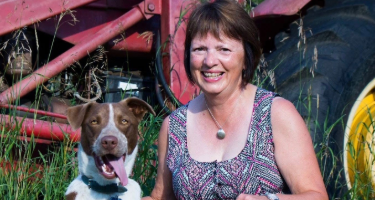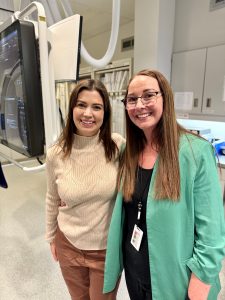
Lorna Clarke was in peak health when her heart problems started.
“It just didn’t make sense to me. I was one of these people that used to run almost every day,” she says. Clarke, then a health-care executive, knew the system inside and out. And yet, she struggled to get a diagnosis. Her chest pain was impossible to ignore, but tests showed nothing. Finally, she was admitted to the Cardiac Catheterization Lab, where her cardiologist found a blocked vessel and placed a stent.
Now after years of dealing with heart issues, Clarke has found hope in the new Women’s Heart Health Clinic at Royal University Hospital (RUH). She was one of the clinic’s first patients and now supports the program as a donor.
“I felt like I was a partner in this process,” she says of her first appointment with clinic co-founder, cardiologist Dr. Dominique Kushneriuk. She reviewed Clarke’s entire medical record, which contained many ER visits, specialist appointments and procedures.
“As a woman, you see a little bit of yourself in your patients. I think I connect with those patients living with these conditions, and I just want to help them,” says Dr. Kushneriuk.
Because their symptoms present differently than in men, women with heart problems are often misdiagnosed and return repeatedly to the hospital.
“It puts strain on the healthcare system, but more importantly – the patient,” says Dr. Kushneriuk.
Many women aren’t aware of their risk factors, which can include early menopause, high blood pressure, autoimmune disease and pregnancy-related conditions.
Unfortunately, Clarke’s experience is not unique.
“I have a story, but there are so many stories. There’s always a very similar thread: access to care, not being believed and feeling dismissed,” she says.
 The clinic’s team approach is changing the narrative. Nurse clinician Jenna Evans is there for appointments and regularly available to patients. She links them with supports such as a psychologist, social worker and pharmacist.
The clinic’s team approach is changing the narrative. Nurse clinician Jenna Evans is there for appointments and regularly available to patients. She links them with supports such as a psychologist, social worker and pharmacist.
“This is something that is really valuable to the community. People are seeing a difference. We’re keeping people out of the hospital. We’re seeing them do so much better,” says Evans.
At the clinic — one of only a handful in Canada — patients are able to get a diagnosis and whole-person care. They spend less time in the hospital, have a better quality of life and finally have a place to be heard.


